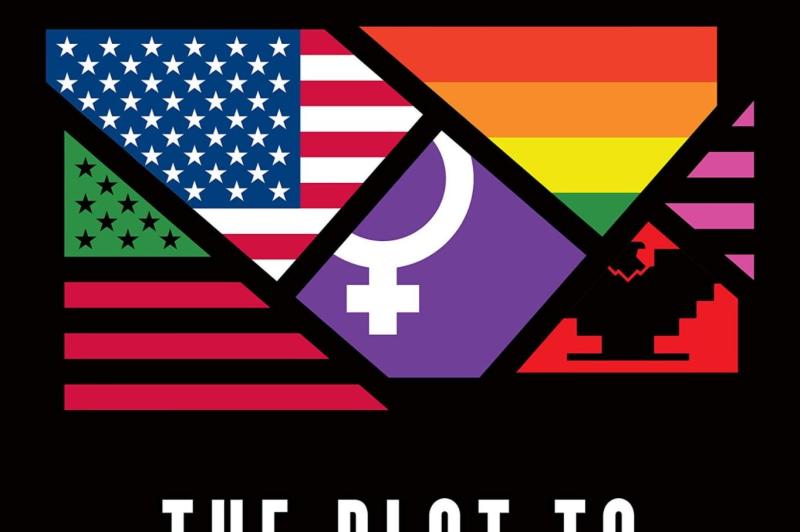How To Foil 'The Plot To Change America'
By: George La Noue (The Federalist)



Mike Gonzalez's new book, 'The Plot to Change America,' provides penetrating analysis of the inherent dangers of identity politics, as well as ways to fight its creeping influence. By George La Noue September 18, 2020
In her 1989 landmark decision in City of Richmond v. Croson , Justice Sandra Day O'Connor criticized identity politics by pointing out the behavior of black politicians who had become a majority of that city's council seats. Richmond certainly had an ugly history of discrimination against blacks, but now had created 30 percent contracting quotas for minority businesses. O'Connor declared that strict judicial scrutiny was required whenever a political majority used race to disadvantage a political minority.
If that were not the law, she concluded: "The dream of a Nation of equal citizens where race is irrelevant to personal opportunity and achievement would be lost in a mosaic of shifting preferences based on inherently immeasurable claims of past wrongs." Although there were ongoing disputes about specific contracting policies, there were few public disagreements in that era about the fundamental principle that Americans of every race should have equal rights. After all, that is how the equal protection clause of the 14th Amendment is written and that principle is the framework of all subsequent civil rights law.
Mike Gonzalez's timely new book, "The Plot to Change America," describes how our aspiration of granting all persons equal rights has been submerged by a form of identity politics that transforms some citizens into political, legal, racial, and ethnic categories demanding proportional representation and sometimes reparations.
The Return of Tribalism
According to Gonzalez, the Angeles T. Arredondo senior fellow on E Pluribus Unum at The Heritage Foundation, the emergence of the current form of identity politics has emerged from two different elite initiatives.
The first influence he traces to the crisis among cultural Marxist philosophers. Their fundamental thesis was to see the world as the conflict between oppressors and the oppressed. Marx's traditional theory of conflict between capitalists and proletarians, however, fizzled out after it led to tyranny and did not produce the desired overthrow of the existing world order.
So theorists such as Antonio Gramsci and later members of the Institute for Social Research at Frankfurt began to emphasize the oppression of members of certain groups (racial minorities, women, and later persons who determined their own gender) and to advocate post-modernism's denial of objectivity. After many of the Frankfurt School leaders escaped Nazi Germany to the United States, they began the critical theory movement. To end oppression, patriarchy, monogamy, capitalism, and even the concept of finding truth and practicing individual virtues became the enemy.
These ideas became very fashionable on many campuses and are now mainstays of leftist politics. It was Herbert Marcuse, in his 1965 essay "Repressive Tolerance," who argued that free speech should be denied to those who did not actively support political platforms of peace, justice, and freedom for all accompanied by government benefits for the poor, weak, and disabled. Essentially, "Repressive Tolerance" is the oxymoron that governs who can speak and what can be debated on many American campuses today.
The second influence comes from federal bureaucratic changes supported by foundation and academic elites, emerging from tough behind the scenes political bargaining almost invisible to the general public. His research on this problem is extensive and original. In chapter 6, Gonzalez focuses on Census Bureau and Office of Management and Budget decisions, which he argues use an anachronistic one-drop blood rule to classify people, reducing the non-Hispanic white population in the county.
Intergroup marriage, becoming commonplace among Asians and Hispanics with whites, is irrelevant to these government counters. Gonzalez quotes a leftist activist who observes, "the worst result would be that long-standing processes of assimilation [would] produce a white dominated mainstream at the national level and in many regions." To the contrary, that result is what Eric Kaufman predicts will happen in his book, "Whiteshift."
Gonzalez does not believe the Asian-American and Hispanic governmental categories are meaningful in any practical sense but are used mainly as political tools. The differences within those classifications are so great that they do not reflect commonalities in terms of language, religion, immigration histories, socio-economic status, or appearances. What in common do Pakistanis and Japanese have? Or Guatemalans with Argentines? Even European Spaniards and Portuguese are sometimes added to the Hispanic category for affirmative action purposes.
He recounts how in the late stages of the Obama administration, an attempt was made to give similar status to those whose origins were from the Middle East and North Africa (MENA). According to Maya Berry of the Arab American Institute, MENA status would give that "community" access to a share of the billions of dollars in the federal budget and more political representation. That effort, at least temporally, ran out of steam after the 2016 election.
If our apertures are opened, however, it can be argued that identity politics is just the current name for what was historically thought of as tribalism. Yuval Noah Harari's "Sapiens" traces the evolution of humans as forms of competition of one tribe against another in the survival of the fittest for their specific environment.
When European nations first explored the Americas, they encountered numerous tribal cultures with various languages and customs at war with one another. The Europeans still had remnants of tribalism among themselves, often along religious lines, but nascent nation-states were emerging in which citizen rights regardless of tribes were beginning to be defined and protected.
Britain's 1215 Magna Carta began a movement to protect individual rights which heavily influenced American colonial charters. In 1776, Jefferson could write in the Declaration of Independence: "We hold these truths to be self-evident, that all men are created equal, that they are endowed by their Creator with certain unalienable Rights…."
Of course, there were still elements of tribalism, as whites largely overcame their ethnic divisions to confront "merciless Indian savages" and perpetuated slavery and Jim Crow segregation. But gradually, if too slowly, Americans accepted an ideal of equal citizenship and created and implemented laws to achieve it.
In 1954, in Brown v. Board of Education , the Supreme Court unanimously thundered "Separate educational facilities are inherently unequal." Now some universities are creating separate spaces and organizations for students defined by race and ethnicity in the name of fostering "diversity," while the goals of integration and assimilation are regarded as reflections of white supremacy. The reversion to identity politics where the positive or negative acts of a specific person are ascribed to a whole racial, ethnic tribe is a terrible step away from the ideals of a civil rights-based nation.
Civil Rights 2.0
In his conclusion, Gonzalez proposes a Civil Rights 2.0 program for dismantling governmental categorization of citizens for the purpose of creating preferential programs. He suggests limiting the disparate impact theory as a tool for program design. Most importantly, he believes in redesigning public education to emphasize what Americans have in common and showing our progress toward achieving goals of liberty and opportunity, instead of over-dwelling on past sins and inequality of results.
As an example of the problem, in higher education, few campuses require students to take a course in American history, but now there are numerous demands that courses in racial and ethnic history be mandated. In the 23-campus California State University system, taking an ethnic study course is now required for graduation. Theresa Montano, professor of Chicana and Chicano studies at UC Northridge, has argued: "If we are serious about democracy… citizen participation…attacking racism, then [ethnic studies] is as important as taking a U.S. history course."
In one sense, many presidential elections have been plots to change America, including the 2016 and 2020 contests. But identity politics intend much more than normal political change by altering the concept of citizenship itself from the promise of equal opportunity to the promise of equal outcomes based on calcified tribal identities.
It seeks to do that by controlling the narrative of American history and capturing the elite institutions of the media and academia that interpret that history. Gonzalez's book should be widely read for its valuable insights into the politics and tactics of this plot.

George R. La Noue is emeritus professor of public policy and political science at the University of Maryland Baltimore County. He is the author of "Silenced Stages: The Loss of Academic Freedom and Campus Policy Debates" (Carolina Academic Press, 2019)

 Article is LOCKED by author/seeder
Article is LOCKED by author/seeder
Tags
Who is online
34 visitors


I'm all in on preventing the "plot." You should be too!